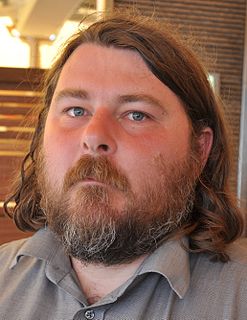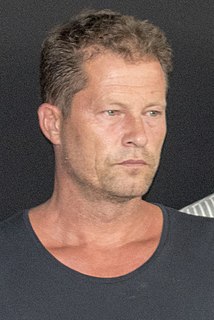A Quote by William Mapother
One of the advantages of shooting digitally was that we had a lot of time. When you shoot, even if you do a good performance, it may get lost in the editing room. It's just one more way that a potentially good film might go astray.
Related Quotes
I'm really specific in the way that I shoot. I've always had a very good sense of what I need in the editing room. I used to shoot in a way that drew more attention to the camera and I've tried, in each film, to draw less and less attention to the camera. I think when you pay attention to the shots, you're aware of the fact that there's a director.
All three parts of filmmaking [writing, shooting, editing] contribute to rhytm. You want the script to be a tight as possible, you want the acting to be as efficient as possible on the set, and you have enough coverage to manipulate the rhythm in the editing room, and then in the editing room you want to find the quickest possible version, even if it's a leisurely paced film. I definitely in filmmaking more and more find writing and directing a means to harvest material for editing. It's all about editing.
If you make a film, that magic is not there, because you were there while shooting it. After writing a film and shooting it and being in the editing room every day, you can never see it clearly. I think other people's perception of your film is more valid than your own, because they have that ability to see it for the first time.
Paris is a beautiful city to walk around in. And, you know, all the obvious things: I like the museums, I like the theater, I like the dance. And it's manageable. The food's good. I know a lot of interesting people here. I lived in Boston for 50 years or more. Wherever I am, I'm usually holed up most of the time in the editing room, and so, when I leave the editing room, even if I just take a walk, it's gorgeous. And I walk everywhere. I'm a victim of the seduction of Paris.
The film is made in the editing room. The shooting of the film is about shopping, almost. It's like going to get all the ingredients together, and you've got to make sure before you leave the store that you got all the ingredients. And then you take those ingredients and you can make a good cake - or not.
Performance is made in the editing room, and I've come to see the truth in that - the idea that they say performances are usually made in the editing room because what you film is the raw material. I think just going through the process of saying, "Which take do we use? Why is that the take we want? I want that take can you edit again, I'm not sure that's the one, I think it's this one." And just because you go through that process, I think somehow it's made me sort of more open about the [actor's] possibilities.
I tend to shoot really quick so you don't get the problems you might get on a traditional film where you shoot one way, then another, and it's pissing down with rain and they won't cut together. We shoot so fast we can incorporate the weather into it. The worst weather we had was when they were in the caravan up the mountain and there was no cover. One man's weather is another man's production value. To create the sleet would cost a fortune but we got it for free so we'll just have to go with it.
I have a great editor and I enjoy, in a masochistic way, being ruthless about my own performance. How do I know, but I think I'm quite good at saying, "That's no good. That's no good. That's it. That's it. That's good." And I'm with the editor who goes, "No, I think you're wrong. That's not your best." There's an initial point in the editing, if you're directing yourself, especially in my case, where you go, "Ouch, ouch, ouch, I can't watch this." And then, there's a point where you become hard-nosed and just take your neurosis away and go, "What's working? That's okay. That's okay. We can lose that, and lose that." You get objective about it.


































